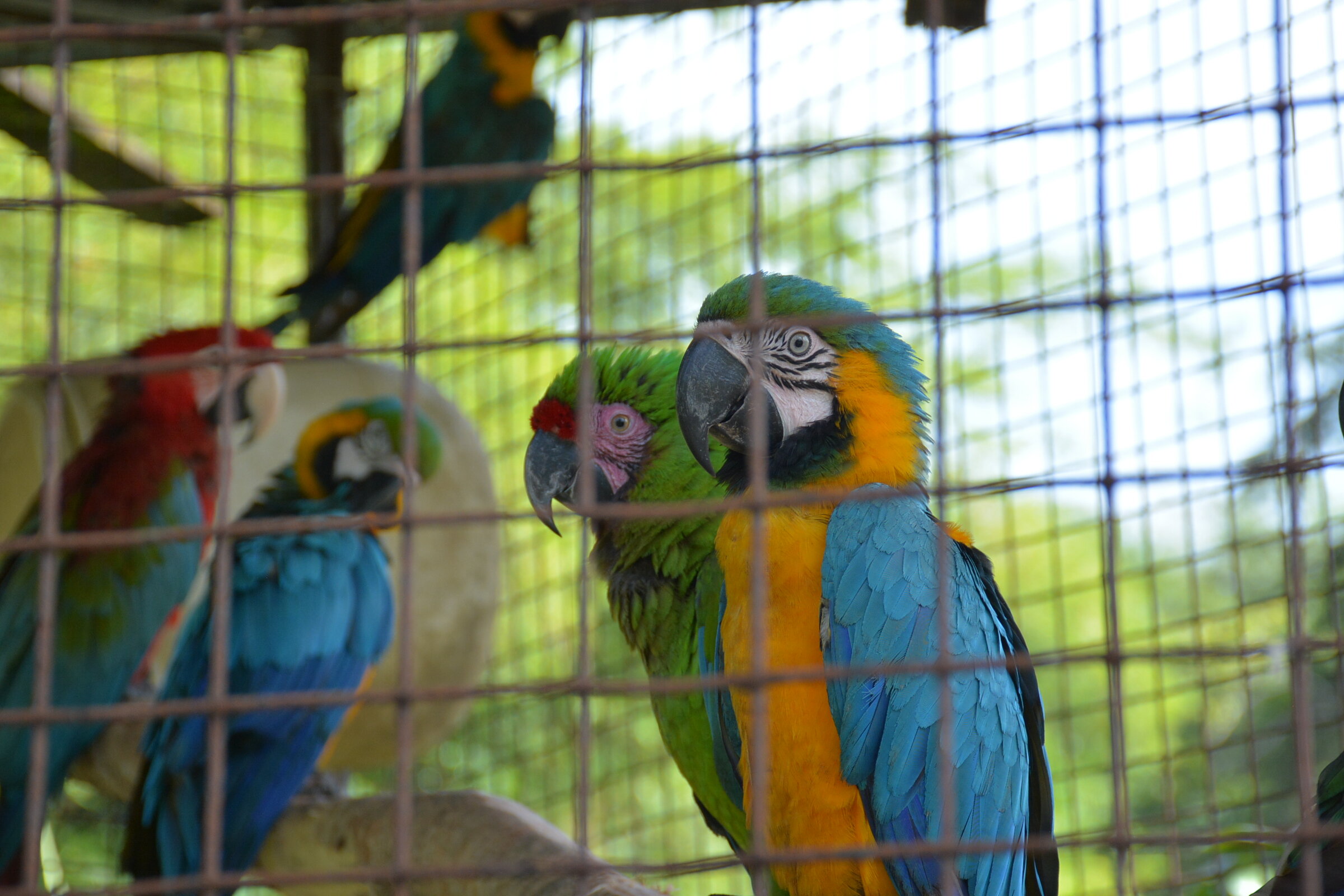Trade Insights: Macaws

I was born to fly over forests.
Macaws are native to tropical and subtropical forests in Central, South America, North America (Mexico), and the Caribbean (Trinidad & Tobago) where they fly through green rainforest canopies, between the trees in woodland forests, and over grassy savannas. These majestic colourful birds have unfortunately been the target of the harmful pet wildlife trade for centuries, due to their large size, beautiful appearance, and mimicry ability.
Some species which have been recorded in the pet trade in Trinidad and Tobago are:
Blue and Gold Macaw (Ara ararauna): After being driven to extinction in Trinidad in the mid-20th century due to the pet trade and habitat loss, they were reintroduced through the special efforts of wildlife conservationists starting in 1999. Pressure from the harmful pet wildlife trade made this species extinct in T&T once before. Let's never let that happen again!
Chestnut-fronted Macaw (Ara severus): This species experiences high rates of mortality in captivity as they require incredibly specialized diets. Unlike other Macaws, Chestnut-fronted Macaws are critically dependant upon the Moriche palm nut for food. Access to this nut is incredibly limited and out of reach for most pet keepers.
Military Macaw (Ara militaris): These Macaws are considered vulnerable to extinction due, in part, to the pet wildlife trade. They are native to Central and South America, usually prefer arid lands over tropical rainforests, and are found at unusually high elevations for Macaws. Most keepers cannot replicate the diverse habitat conditions that they are found in.
Scarlet Macaw (Ara macao): These birds are native to South America. They have a 1-metre wingspan and can fly up to 15 km in a single unbroken flight. Ethical care of these birds requires a commitment to providing full-sized flight cages, free flight training, and much time and effort to keep them stimulated, well fed, and healthy.
Other species known to be traded in T&T include the Green-winged Macaw (Ara chloropterus), Hahn’s Macaw (Diopsittaca nobilis), Hyacinth Macaw (Anodorhynchus hyacinthinus), and Red-bellied Macaw (Orthopsittaca manilatus).
“They will have it in a crocus bag. And these are young birds that don't have any feathers, and they will have a whole 9 or 10 of them inside that bag." - Disturbed Macaw Keeper in Trinidad and Tobago
Macaws trafficked from South America into Trinidad suffer terribly since traffickers typically use destructive and harmful methods to transport wildlife for the illegal pet trade. This includes storing large numbers of Macaws in confined spaces. These large birds are roughly shoved into small cages, sacks, and crates where they experience excessive heat, dehydration and malnutrition, physical trauma, and virulent disease transmission. They may even be crushed to death under the weight of other birds. The survivors often later fall prey to the injuries and diseases contracted in these highly unsanitary transport conditions. No veterinary care is provided.
“It has to stop, because it's hours of torture, yes. Who wants to be tortured?” - Horrified Macaw Keeper
Even worse, Macaws are often stolen from their parents' nest at a very young age. A Macaw can be as intelligent as a three year old child. Can you imagine what it might be like for a creature as smart as a toddler to be kidnapped from their parents, put in a cramped container with no food or water, shipped blind and wet across the rough ocean, and finally sold into lifelong captivity?
“A lot of people, they just have a cage, and food and water, and it might talk, but you don’t really see much happiness in the bird.” - Dismayed Macaw Keeper
Many people think they are providing enough care for a caged Macaw by simply providing food and water. This is not the case. In fact, leading experts rate Macaws as “almost impossible” for the average person to provide with adequate care.
The specialized need of captive Macaws include:
Caging: A full-sized flight cage and commitment to free flight training is necessary. The standard cages sold in pet stores are wholly inadequate for this large, intelligent bird born for flight.
Commitment: Macaws are very loud, social birds which require a very strict routine from their keeper, often to the detriment of the keeper’s sleep schedule and social life.
Diet: Macaws have highly specialized dietary needs which include a wide range of fruits, nuts, and nutritional supplements.
Stimulation: Macaws can be as intelligent as a 3 or 4 year old child and therefore need high amounts of stimulation, attention and play.
Vet Care: Regular vet visits are required to ensure that captive Macaws stay healthy and reach their full life span of 50 years.
“Because Macaws, if they're not happy, they will pick out all the feathers. What was the point of having a bird? Just to say, ‘Hey I have a Macaw [to show off]?’ No.” - Upset Macaw Keeper
The striking beauty of Macaw feathers makes them popular in the pet trade. However, Macaws are complex creatures with highly specific needs. Many Macaw keepers are unprepared for the realities of caring for such a highly intelligent bird.
Inadequate care may cause Macaws to self harm. This often manifests as feather plucking, where the stressed bird rips out its own feathers. The injured bird is then left exposed to the elements and harmful pathogens, rendering the wounds vulnerable to infection. Once the bird has lost its beauty, it may be subject to further neglect culminating in an early death.
Reasons for feather plucking include:
Hidden Medical Issues: A Macaw experiencing health problems unnoticed by the keeper, such as allergies and parasites, may pluck to self sooth.
Environmental Stress: Unpleasant physical conditions like excessive noise, heat, insufficient access to natural light, and more can lead a bird to self harm.
Malnutrition: A Macaw with a poor diet is more susceptible to stress and illness which may lead to self harm.
Mental Stress: A Macaw deprived of play time, toys, exercise, and/or mental stimulation experiences anxiety and boredom.
"Some Macaw owners feed their birds too many sunflower seeds. That is like giving candy to children." - Troubled Macaw Keeper
Sunflower seeds are commonly sold in pet stores as bird food. As part of a balanced diet they are a good source of fats, however, too much fat is a recipe for poor health. Unfortunately, many pet keepers are unaware of how to properly balance their bird’s diet, leading to serious and even deadly nutritional deficiencies.
In the wild, Macaws have diverse diets; foraging for seeds, fruits, flowers, nuts, nectar, and even clay from river banks. Replicating this diet in captivity requires time, effort, and a desire to learn from veterinary professionals about what birds need.
Captive Macaws commonly suffer from nutritional deficiencies in Vitamin A, Calcium, and Protein. Vitamin A deficiency can cause dry skin, lowered immune system, and recurrent infection. Calcium and Phosphorus deficiencies as well as Vitamin D imbalances can cause bone disease, seizures, and abnormally shaped bones/beaks/nails. Protein deficiency produces feather malformation, stunted growth, and a lowered immune system. These conditions can be avoided by ensuring that the Macaw has a well balanced diet.
Foods rich in Vitamin A include carrots, sweet potatoes, peppers, paw paw, bhagi, and broccoli. Okro, sesame seeds, and dark green veggies like pakchoy contain Calcium. Protein can be found in nuts and in beans like bodi and channa, although dried and canned beans should not be used.
Remember, some Macaws may have distinct dietary needs. Responsible Macaw keepers should consult with their vet about nutrition as well as taking their birds for regular check ups. Check ups are very important as many avian diseases and deficiencies do not present until it is too late.
Macaws are Protected Animals under the Conservation of Wild Life Act (CoWLA). It is illegal to keep captive or sell them in T&T without special permits issued by the state. Any person found in possession of a Macaw without a permit is liable to a fine of $5,000. Globally, the trade in Macaws is regulated under CITES Appendix II with some species being provided even higher levels of protection.







